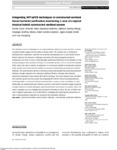| dc.description.abstract | The sanitation control of pathogens in the tropical effluents needs much more attention to ensureecosystem health integrity and the safety of human health. The common use of chemicals inachieving this in wastewater treatment has remained unsustainable due to much health concern.Indeed, based on the numerous challenges associated with faecal pathogenic bacteria inwastewaters, the focus is now on achieving higher purification efficiencies in the elimination of thehuman pathogens from wastewater through eco-sustainable systems such as constructed wetlands(CWs). Hence, the need to explore the application of constructed wetlands in wastewater treatmentunder specific local environmental conditions for accurate understanding and improved treatmentefficiency. This study therefore aimed at monitoring constructed wetlands faecal bacteria purificationefficiency through integrated non-molecular membranefiltration technique and molecularquantitative polymerase chain reaction (MFT-qPCR) technique. The results showed some shortfall inthe treatment system and also proved that integrating MFT-qPCR in faecal bacterial purificationmonitoring within a constructed wetland system provides a more accurate and reliable outcome.Additionally, the wetland purification efficiency was low (<80%) with the dissolved oxygen posing thestrongest influence on faecal pathogenic bacterial purification trend across the wetland. Hence, theneed to regularly carry out dredging and macrophyte harvesting as well as the use of holistic andmore integrative approaches such as MFT-qPCR in managing and monitoring the performance ofCWs in faecal pathogen eradication for improved CWs purification efficiency. | en_US |

